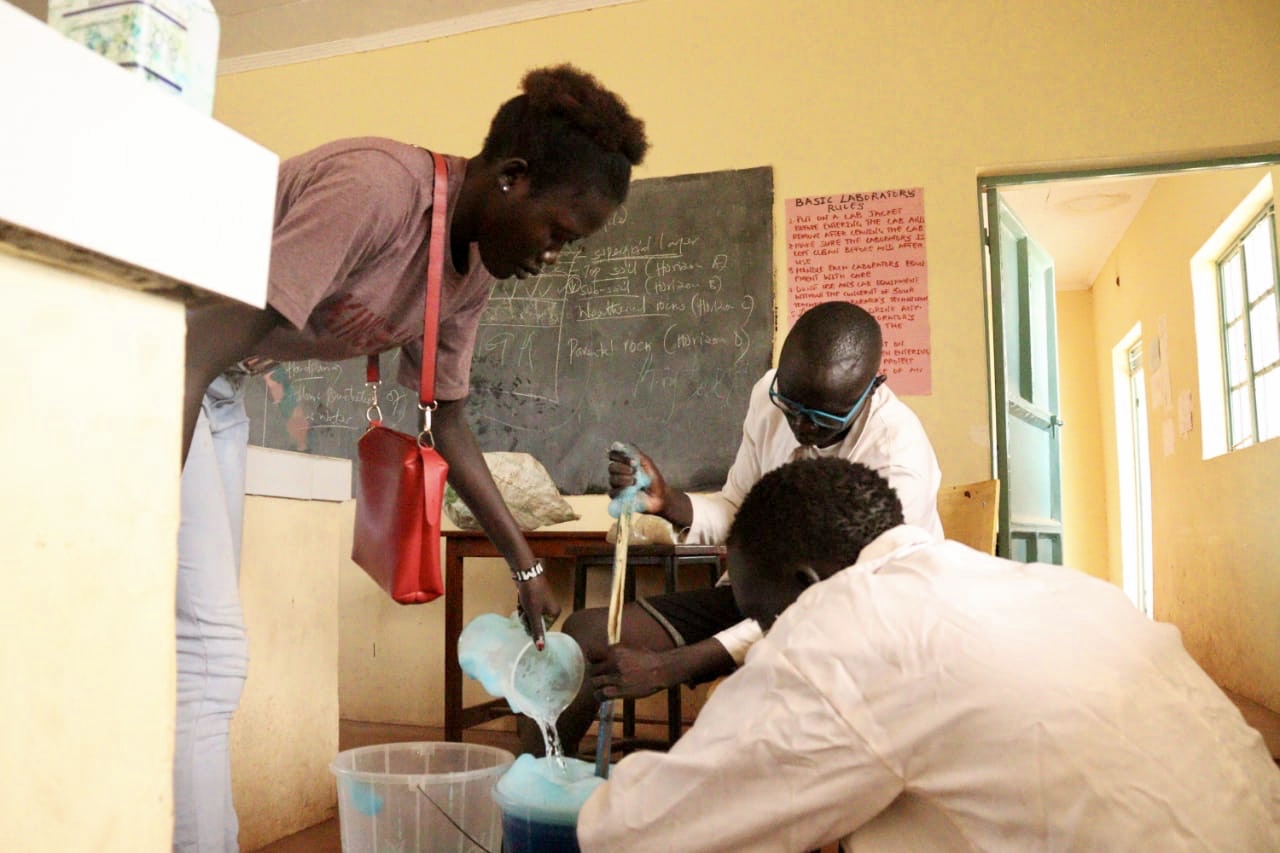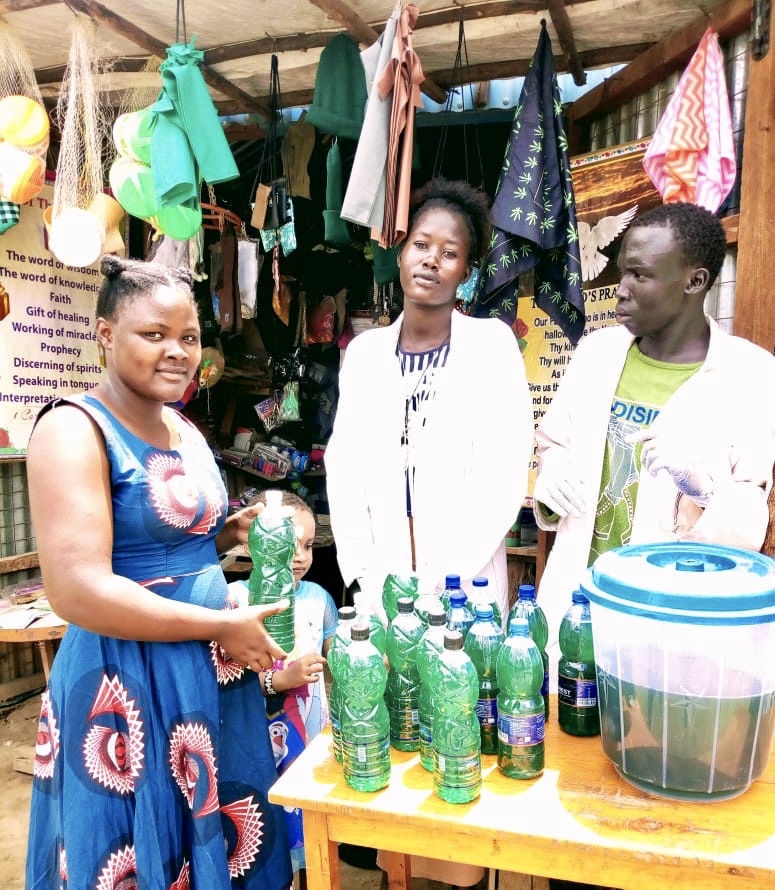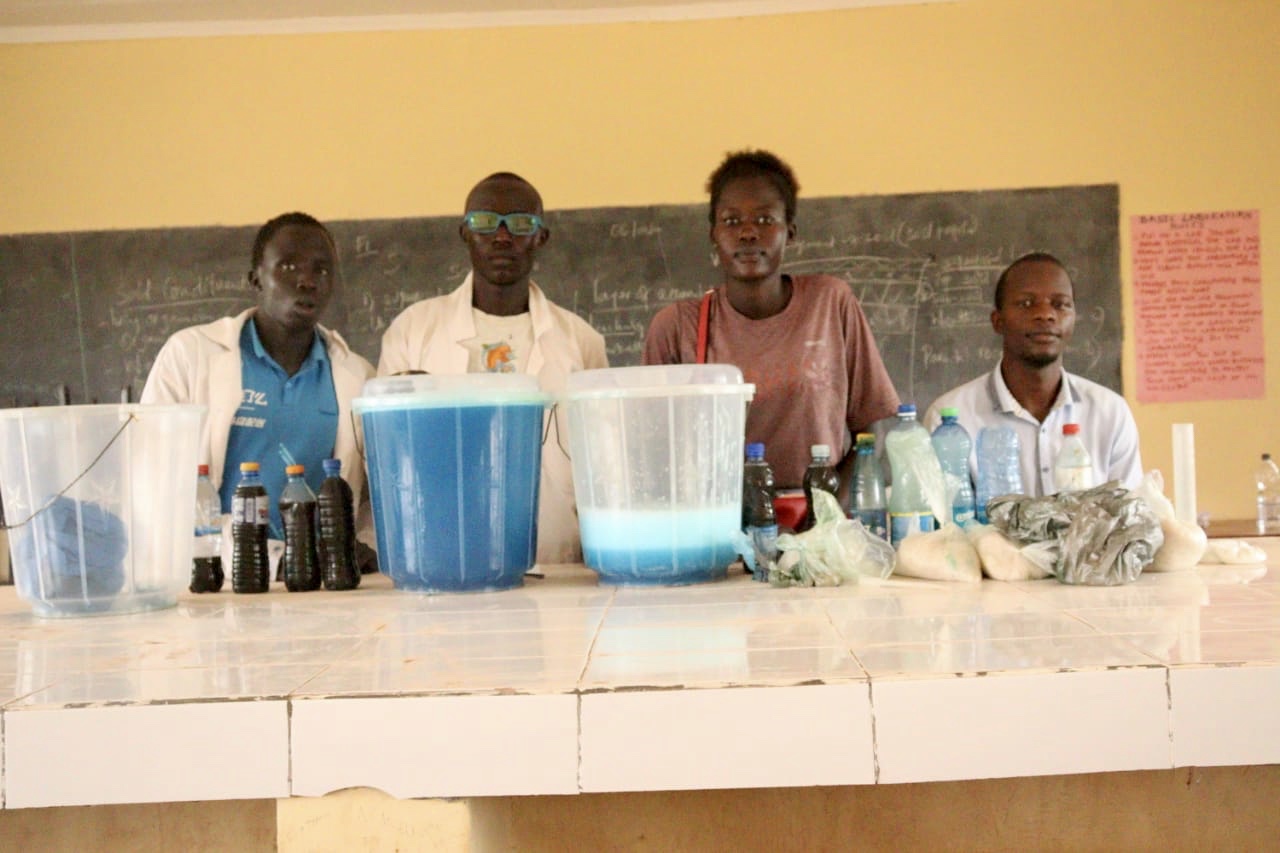By Baluu Wol Makuach – KANERE Staff Writer, May 2020
Students at Kakuma Refugee Secondary School are responding to the Covid-10 pandemic by manufacturing detergent soaps for sale to the community.

Rebecca William Deng, a South Sudanese refugee who resides in Kakuma One, explained that they experimented and made soap in school even before COVID-19 became a threat. “We don’t usually make the soap for selling, but we started selling the soap because of the coronavirus, in order to help the community”. “At first we only made soap for school use but after school closure we decided to step in with the aim of promoting hygiene.” she added.
With the knowledge and guidance from the Head of Science Department, Mr. Batch Osore, students are able to produce their products and sell them to the refugees at affordable prices.
“Mr. Osore is our trainer and head of production. Dombolo Monykur and I are currently contributing our time to make soap. Due to Covid-19, others have gone to their respective homes, some in Hong Kong, Kakuma 4 and others Kakuma 3.” said Rebecca.
According to their teacher, the students have a bright future ahead. “There is big potential in Rebecca and Dombolo. They are quick learners and the soap making skill can be their secret weapons.”
After schools were closed due to Covid-19, Osore continued experimenting with soap production in the school. On evening as he was on his way back home, Osore met an enthusiastic Rebecca, who suggested that they reignite soap production to help supply the community. “You know the person who came up with this idea was that lady Rebecca,” Osore explained.
Rebecca is an ambitious lady who grew up dreaming to be a lawyer. Rebecca’s dream of studying law remains unchanged, but in order to challenge herself, she signs up to the science club. Asked if her dream changed after she joined the science club she said “being a science student is something l enjoy doing. It’s like a hobby.”
Students are selling their products at surprisingly cheap prices. One liter of detergent soap is now selling for only 100 shillings. “We are selling it, but the price is very low… for the customers, it is a good price.” Currently their main target customers are refugees living in the camp. Majur Monykur Arok, who goes by the nickname Dombolo, is a resident of Kakuma 1 and is one of the two active members of the club. “We sell soap at low price because we understand the refugees living standard”. In Kakuma, refugees main source of living is the relief food distributed in the camp and the restricted cash transfers provided through the Bamba Chakula programme. In Kakuma, many refugees live on less than three dollars per day. Dombolo explains, “We want to help the refugee community in this pandemic period.”

Due to Coronavirus, production is now limited to only the two students and their teacher. The science student club is composed of students from across Kakuma Camp, but the closure of schools due to Covid-19 has kept some at home, despite their interest in joining the group to produce soap.
In response to high demand, the students stepped up their production rate. “This is a trying time for everyone, the little we can do is to step up our production to enable us to reach out to a good number of refugees,” said Dombolo.
Osore has stepped up the production by tripling his daily production due to public demand. “Previously we used to produce 20 liters of soap and it could stay even for a month, but nowadays we can produce more. Recently, we produced 80 liters, and all of it is sold within two days”. Osore claims there are already back orders totaling 120 liters.
While the product is very affordable, Rebecca and Monykur are facing some challenges, such as finding bottles for packaging the product and establishing a fixed point of sale. Currently, the liquid soap is stored in a bucket and ready to be poured into bottles for retail. A water bottle would suffice for packaging. “You see the market is demanding but we don’t have a mechanism to reach Kakuma 3, 4 and 2. We don’t currently have a means of transport, but if we can get that we could also be able to reach there,” Osore added.
Initially, the club lacked funds undertake production. However, Osore used his own funds to guarantee that the production could continue. “We have not been given funds so I took it from my pocket as a teacher. This is not about money”, he explained. “It is about our health. If we get somebody who we can cooperate with, it could be better. Like a donor or an agency to cooperate with. So far we just get assistance from our school.”
Osore explains that the KRSS science club started with 10 students. “They were interested to do a presentation as we were invited to present at World Refugee Day. So, we spent three days preparing, and in the end, we made a product. We are targeting those students who are serious. It’s not a club for jokers, no. We want those students who can come up with ideas.”
In June 2019 during the World Refugee Day celebration in Kakuma the students had the honor of representing their school by presenting their product. Dombolo happily recalls the day of the big event. “I realized that I others while listen to me when I set my mind to things. The day was a brand for us to be known both in Kakuma refugee camp and the world.” Rebecca did not participate that year due to other obligations, but she is anxiously waiting to represent her school in this year’s World Refugee Day. “I hope the Coronavirus pandemic goes away soon. I am afraid it will rob me of a lifetime opportunity”.
KRSS is already drawing interest from other students. “We’ve added ten more students with passion to learn” said Osore

Kakuma might have a hostile environment, but the struggle for daily life can teach residents to clear obstacles off their paths. The use of technical knowledge to produce soap at KRSS is a reminder of the practical benefits of a science education.
